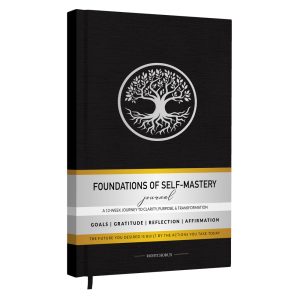In a world where our days are increasingly dictated by noise, notifications, and endless to-do lists, journal prompts for self discovery offer a quiet pathway back to self.
In the very first moments we pause to reflect, we reconnect with our deepest truths, creating space for authenticity, healing, and inner clarity.
Whether you’re navigating a life transition, seeking greater purpose, or simply craving self-awareness, reflective prompts can act as a mirror—revealing who you are beneath the noise.
In this post, we’ll explore how to use guided questions to unlock insight and balance. And for those looking for structure and inspiration, the Foundations of Self-Discovery Mastery Journal is a powerful companion—combining curated prompts with personalized daily tracking tools to help you grow with intention.
Foundations of Self Discovery & Mastery Journal: A 13-Week Personal Development Journal System
$29.95
The Foundations of Self Discovery…
Table of Contents
What Are Journal Prompts for Self Discovery?
Journal prompts for self discovery aren’t just thought-starters—they are springboards into the kind of self-reflection that drives real inner transformation.
Instead of staring at a blank page, prompts open up new pathways for introspection, helping us gain access to hidden emotional layers, past patterns, and aspirational truths.
Used consistently, they strengthen a deeper connection between your conscious choices and subconscious drivers, ultimately empowering you to make aligned decisions in life.
Why Do Journal Prompts Matter for Self-Reflection?
Journal prompts support self-reflection by bypassing mental clutter and sparking curiosity.
They nudge your mind toward focused topics, often illuminating aspects of your identity or inner world that were previously overlooked.
Here’s why prompts can deepen your journaling practice:
- They reduce decision fatigue by offering clear direction.
- They help identify values, emotional patterns, or unresolved experiences.
- They evoke honest, emotionally grounded responses.
- They turn vague goals into actionable plans through mindful clarity.
As a result, you’re not just journaling—you’re growing. A structured tool like the Foundations of Self-Discovery Mastery Journal enhances this effect with daily guided entries and a six-part framework that prompts personal inquiry and improvement.
How to Use Journal Prompts Effectively
To harness the full power of prompts, it helps to build a ritual around your journaling time. Small shifts in intention and environment can amplify the depth of your writing.
Follow these strategies to maximize the experience:
- Set aside uninterrupted time in your day to reflect.
- Create a cozy, quiet space with elements that calm (think candles or soft background music).
- Approach each prompt with mindfulness—focus on your breath before you begin.
- Allow imperfection—write freely without correcting grammar or overthinking.
Journaling with a tool like the Foundations of Self-Discovery Mastery Journal simplifies this process with thoughtfully designed prompts that cue both insight and action, plus progress checkpoints to see your evolution.
Foundations of Self Discovery & Mastery Journal: A 13-Week Personal Development Journal System
$29.95
The Foundations of Self Discovery…
Building a Self-Discovery Ritual with Daily Prompts

Transforming journal prompts into a consistent practice begins with rhythm and space. A journaling ritual helps you root your self-discovery into your daily life, where insights unfold gradually and compound over time.
Whether you prefer the energized lens of the morning or the introspective calm of evening, integrating prompts into your routine aligns your aspirations with daily reflection.
Morning vs. Evening Journaling: When It’s Most Effective
The time you choose to journal influences the tone and direction of your self-inquiry.
Morning journaling provides clarity and focus, while evening reflection lends itself to emotional processing and integration.
Morning benefits:
- Clears mental fog and anchors your day.
- Reinforces purpose by identifying your daily intention.
- Helps anticipate challenges or triggers before they unfold.
- Aligns thoughts with personal goals and affirmations.
Evening benefits:
- Encourages emotional release and stress reduction.
- Cultivates closure by reviewing what went well.
- Uncovers patterns in thoughts, triggers, or habits.
- Offers inspiration for a grounded tomorrow.
With the Foundations of Self-Discovery Mastery Journal offering both morning and evening page spreads, you can embrace both benefits for a balanced ritual that supports mental clarity and emotional growth.
Creating Your Sacred Journaling Space
Your journaling environment isn’t just a physical space—it sets an emotional tone. Crafting a setting that feels sacred, safe, and inspiring supports emotional openness and reflection.
Here are ideas to elevate your journaling space:
- Add calming elements like essential oils, soft lighting, or plants.
- Play ambient sounds or focus-enhancing music for added mindfulness.
- Use intention-setting practices such as lighting a candle or taking deep breaths before you write.
- Keep your journal and a favorite pen readily accessible.
Pairing this mindful space with the Foundations of Self-Discovery Mastery Journal allows you to step straight into your practice, grounded and ready to reflect.
Exploring Identity Through Journal Prompts
Identity work is at the heart of self-discovery. Journal prompts geared toward exploring your sense of self open doors of awareness that often lie dormant.
By pausing to examine who you are beyond roles and expectations, you start to clarify core values, redefine purposes, and let go of identities that no longer serve you.
Deep Questions to Ask Yourself
When it comes to identity, the right questions can offer profound clarity. These prompts invite you to challenge assumptions, embrace nuance, and recognize your evolving self.
Try these identity-deepening prompts:
- “Who am I without my roles or job titles?”
- “What parts of me have I hidden to feel accepted?”
- “What truths do I know inwardly but struggle to express externally?”
- “What labels have I outgrown?”
When journaling with tools like the Foundations of Self-Discovery Mastery Journal, you’re encouraged to explore these topics gradually through its curated daily questions—making deep reflection feel safe and structured.
Using Prompts to Reflect on Your Past
Our paths are often mapped by our earliest experiences. Reflective writing about the past allows you to reframe narrative lenses, reclaim agency, and heal former wounds.
Start with questions like:
- “What belief did I form in childhood that no longer resonates?”
- “Which past experiences shaped my resilience?”
- “What past decisions taught me the most about authenticity?”
- “How has my idea of ‘success’ evolved over time?”
The Foundations of Self-Discovery Mastery Journal includes built-in prompts that respectfully guide you through past memories, enabling emotional healing without overwhelm. Its affirmation section offers grounding when exploring more sensitive reflections.
Foundations of Self Discovery & Mastery Journal: A 13-Week Personal Development Journal System
$29.95
The Foundations of Self Discovery…
Tracking Growth with Reflective Journaling

Personal growth isn’t just about insight—it’s about momentum. Once we excavate our truth through self-discovery, the next step is aligning our life with that truth.
Reflective journaling helps bridge the gap between awareness and action by turning realizations into repeatable, values-driven habits.
It’s not just what we uncover, but what we do with it that shapes transformation.
From Awareness to Action: Turning Insights into Plans
Awakening to your core truths means little unless there’s a system in place to nurture those insights into daily living. That’s where journaling becomes a tool for strategic change.
Here’s how to shift reflection into forward momentum:
- Identify recurring insights and link them to specific goals.
- Use daily affirmations as cues for new habits.
- Break big realizations into micro actions for tangible progress.
- Track wins and setbacks to stay motivated.
With its structured progress checkpoints, habit-tracking pages, and “Tomorrow’s Next Step” feature, the Foundations of Self-Discovery Mastery Journal turns awareness into sustainable action.
Monthly Reflection and Review Prompts
Monthly journaling reviews reinforce growth and reset direction. They help highlight accomplishments, identify lingering emotional patterns, and clear space for your next phase.
Try these review prompts:
- “What did I learn about myself this month?”
- “Which limiting beliefs did I challenge or release?”
- “Where did I feel most alive?”
- “What’s one insight I want to carry forward into next month?”
The Foundations of Self-Discovery Mastery Journal offers structured monthly checkpoints that encourage insight tracking and next-step clarity—making goal recalibration both intuitive and aligned.
Foundations of Self Discovery & Mastery Journal: A 13-Week Personal Development Journal System
$29.95
The Foundations of Self Discovery…
Healing Through Written Self-Discovery
Journaling is often one of the safest containers for emotional healing. When we write, we not only interpret our feelings—we metabolize them.
Through gentle prompts and compassionate observation, difficult emotive baggage can be acknowledged and released.
A practice grounded in mindful self-discovery transforms our past pains into powerful markers of growth.
Using Journaling to Release Emotional Baggage
Expressive writing is known to decrease stress and improve emotional regulation. When used for emotional release, journals offer a private outlet for processing grief, heartbreak, fear, or shame.
Here are prompt ideas to facilitate emotional clearing:
- “What emotion keeps resurfacing, and where do I feel it in my body?”
- “What unspoken pain do I want to voice here?”
- “What am I finally ready to let go of?”
- “What boundary or truth am I avoiding?”
The Foundations of Self-Discovery Mastery Journal supports this with a grounding affirmation structure and quote-question system that gently guides emotional processing without retraumatization.
Inner Child Dialogue Journal Prompts
Speaking to your inner child unlocks a profound level of healing and reconnection. It allows you to validate early wounds and reorient them with present-day support and love.
Use prompts like:
- “What did my younger self need to hear most?”
- “What childhood fear still influences me now?”
- “If I were to write a letter to my 7-year-old self, what would I say?”
- “Where do I see the inner child in my daily thoughts or reactions?”
When exploring vulnerable terrains like inner child work, it helps to have a trusted structure.
The Foundations of Self-Discovery Mastery Journal provides grounding affirmations and progress tracking to keep the process emotionally anchored.
Foundations of Self Discovery & Mastery Journal: A 13-Week Personal Development Journal System
$29.95
The Foundations of Self Discovery…
Unlocking Purpose Through Journal Prompts for Self Discovery

Many people turn to self-discovery to answer a core question: Why am I here? Whether you’re realigning your career, redefining success, or craving more meaning, journaling helps translate internal nudges into life direction.
Purpose isn’t always found in a breakthrough moment—it’s often revealed in the breadcrumb trail of your consistent reflections.
Clarifying Values and Strengths Through Purpose-Centered Prompts
Clarifying who you are primes your life pathway. When your values align with personal strengths, purpose becomes your default state—not a distant goal.
Prompts to consider:
- “When do I feel most fulfilled and why?”
- “Whose problems do I feel called to help solve?”
- “What work or activity makes time disappear for me?”
- “What do people seek me out for?”
Tools like the Foundations of Self-Discovery Mastery Journal blend identity inquiry with action-oriented journaling—ensuring that insights about purpose become part of your daily lens.
Aligning Daily Actions with Long-Term Mission
Once you have clarity on what drives you, it’s time to live it—daily.
Ways to stay aligned:
- Set one intention a day that supports your larger mission.
- Use evening reflections to track alignment slip-ups without judgment.
- Link weekly or monthly goals to your purpose statement.
- Revisit long-term visions often to create emotional linkage.
In the Foundations of Self-Discovery Mastery Journal, you’ll find strategic tools to integrate purpose with planning, giving your days both meaning and momentum.
Conclusion
Using journal prompts for self discovery isn’t just a mental exercise—it’s an ongoing act of self-loyalty. In every entry, you reconnect with your intuition, mettle, and authenticity.
By creating space to name your truths, witness your wounds, and document your growth, you begin to show up in the world with more presence, clarity, and purpose.
Let this practice anchor you, especially when life feels chaotic. And if you’re seeking the perfect companion on this introspective path, the Foundations of Self-Discovery Mastery Journal offers a beautifully structured format to keep you grounded, expressive, and ever-evolving.
Self-discovery is a journey—and it starts with one honest page.
Frequently Asked Questions
Journal prompts for self discovery are reflective questions designed to help you gain awareness of your thoughts, beliefs, emotions, and patterns. They guide you toward clarity on who you are, what you value, and what areas of growth you’re ready to explore.
Aim for 10–15 minutes daily to cultivate depth and rhythm. Even journaling 2–3 times a week can foster meaningful transformation when done with intention.
The Foundations of Self-Discovery Mastery Journal is an excellent option. It includes 365+ curated prompts, habit tracking, and built-in monthly checkpoints, making it ideal for anyone serious about sustainable inner work.
Yes—expressive journaling helps regulate emotions by providing a safe space for emotional release. Prompts can reveal patterns and triggers, aiding in self-awareness and emotional resilience.
Write down a single thought or emotion, then let the words flow from there. You can also return to the prompt later. Tools like the Foundations of Self-Discovery Mastery Journal offer supportive cues to help break through resistance.
Link journaling to an existing habit like morning coffee or evening wind-down. Use built-in accountability like the Foundations of Self-Discovery Mastery Journal, which includes structure and progress checkpoints.
Both are valuable. Prompts guide focused exploration, while free writing allows emotional flow. A journaling practice that honors both styles can cultivate richer insights.
Handwriting can enhance mindfulness and cognitive retention. A physical tool like the Foundations of Self-Discovery Mastery Journal also offers a tactile, visual sense of progress.
Absolutely. Many prompts naturally uncover desires, talents, and decision-making patterns—perfect for goal alignment and career visioning.
Yes, especially when using structured tools like the Foundations of Self-Discovery Mastery Journal. Beginners often find comfort and confidence in a guided approach that makes deep reflection feel intuitive.







